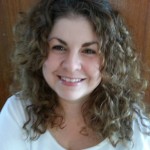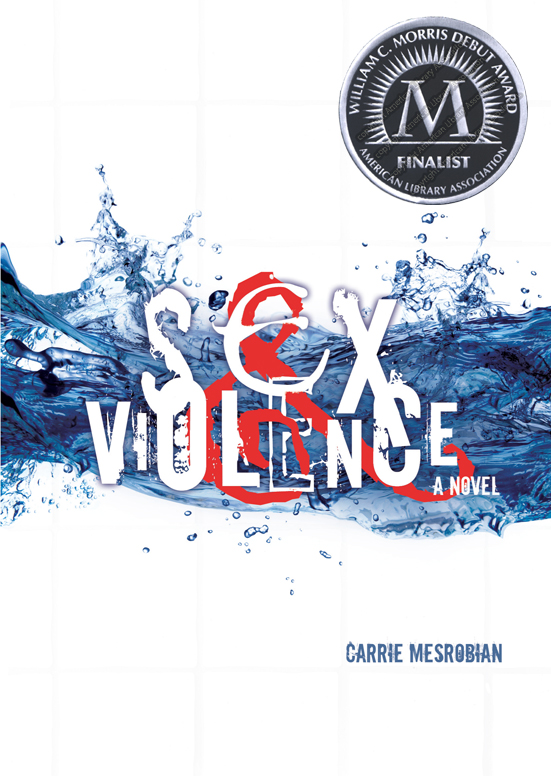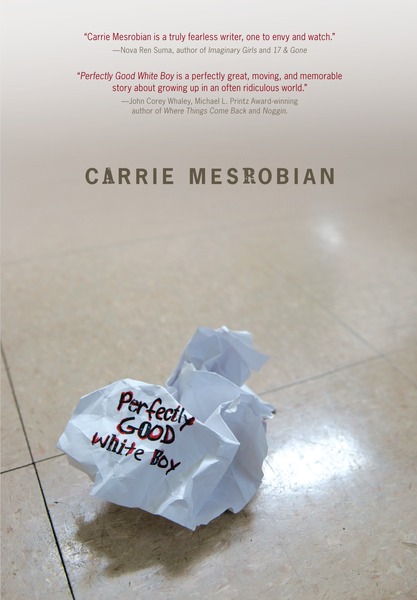Q&A With Carrie Mesrobian MFA ’13
Rave Reviews Are Rolling in For Her New Book, ‘Perfectly Good White Boy’
Right out of the gate, Carrie Mesrobian’s first young-adult novel, Sex & Violence, racked up some serious accolades:
• 2014 William C. Morris YA Debut Award Finalist
• YALSA’s 2014 Best Fiction for Young Adults nominee
• Cybils Best Young Adult Fiction finalist
• Winner, 2014 Minnesota Book Award, Young People’s Literature
Keep up With Carrie Mesrobian
Blog: www.carriemesrobian.com
Tumblr: www.carriemesrobian.tumblr.com
Twitter: @CarrieMesrobian
That doesn’t happen to a lot of authors—especially twice in a row. Unless, maybe, you write like Mesrobian, a 2013 graduate of PLU’s  MFA Rainier Writing Workshop. Her second book, Perfectly Good White Boy, comes out Oct. 1—and already, the hugely influential Publisher’s Weekly has selected it as one of its Books of the Week, and Kirkus Reviews named it one of “This Fall’s Most Anticipated Young Adult Novels.” (The Kirkus review read, in part: “Engaging, perceptive, witty and at times gut-wrenchingly sad—this is an extraordinary addition to fiction for teens and adults alike.”)
MFA Rainier Writing Workshop. Her second book, Perfectly Good White Boy, comes out Oct. 1—and already, the hugely influential Publisher’s Weekly has selected it as one of its Books of the Week, and Kirkus Reviews named it one of “This Fall’s Most Anticipated Young Adult Novels.” (The Kirkus review read, in part: “Engaging, perceptive, witty and at times gut-wrenchingly sad—this is an extraordinary addition to fiction for teens and adults alike.”)
We caught up with Mesrobian, who teaches creative writing at The Loft Literary Center in Minneapolis; here she shares her reaction to literary success, her writing approach—and why attending PLU’s RWW was like “going to Hogwarts.”
Q: Your first book, 2013’s Sex & Violence, won the 2014 Minnesota Book Award for Young People’s Literature and was nominated and/or a finalist for several other Really Big Deals. What kind of mixture of surprise/relief/excitement/validation did that elicit? When did it hit you that you had seriously knocked your first book out of the park?When the Morris Award announcement came, I was little shocked. It was very odd, but yes, it felt wonderful to know that the  librarians and book people who had read it felt that it deserved that distinction. The day before, I’d been down at my editor’s office working on our second book, as my house was being remodeled and he had an open office he could provide me at the time. For some unknown reason, I’d felt a little ill and actually fainted on the carpet, knocking my head into a bookcase and spraining my finger, which was sort of embarrassing. So I’d gone home early that day, just a few hours before he got the actual call from YALSA. When he phoned the next morning to tell me about it, I was lying in bed feeling kind of terrible. So that was also weird. But then I spent the day being a lazy lump in bed reading and napping, so that was a nice little reward.
librarians and book people who had read it felt that it deserved that distinction. The day before, I’d been down at my editor’s office working on our second book, as my house was being remodeled and he had an open office he could provide me at the time. For some unknown reason, I’d felt a little ill and actually fainted on the carpet, knocking my head into a bookcase and spraining my finger, which was sort of embarrassing. So I’d gone home early that day, just a few hours before he got the actual call from YALSA. When he phoned the next morning to tell me about it, I was lying in bed feeling kind of terrible. So that was also weird. But then I spent the day being a lazy lump in bed reading and napping, so that was a nice little reward.
The Minnesota Book Award was even weirder. I couldn’t believe a group of Midwestern librarians and book people would nominate, much less vote to win, a book called Sex & Violence. I’m really thankful that they did; these are the same people who stock this book in their Teen collections and face potential public scrutiny about such choices. That is a true honor, I think. The other nice thing is that my book was published by a Minnesota publisher, written by a Minnesotan and set in Minnesota. So that was kind of cool; I’m obviously a bit provincial about the state I call home.
Q: And now Kirkus Reviews—hands-down one of the most influential trade magazines in publishing—has called your new book, Perfectly Good White Boy, one of “this fall’s most anticipated young adult novels.” Firstly, huge congratulations! Secondly: Wow. What does that distinction tell you or mean to you? Kirkus liked Sex & Violence, too, so my worry was that they wouldn’t like the second book. I was kind of holding my breath. The first time all these reviews started trickling in, I had no idea they were coming. So this time around, I knew that they were out there,  lurking in the ether, and it gave me pause. I’m very glad they liked it; I won’t lie. I’m not at the stage where I can say I just write what I like and people’s responses don’t matter. They still matter to me, unfortunately. When you write a book, all the drafts and deletions and revisions stay with you in your head, like the accretions in a coral reef. So to me, the books are comprised of all these successes and failures and botched attempts; it’s hard to look at it as this pared-down holistic thing, like it is when readers receive it. By the time I finished both of these books, I was so sick of them, actually! I can’t really be objective about what I write at that point; I think it’s all tiresome and crappy and just want to get on to the next project. I just finished a third novel for HarperCollins and had the same exact experience as well, so I’m guessing that’s the new normal for me.
lurking in the ether, and it gave me pause. I’m very glad they liked it; I won’t lie. I’m not at the stage where I can say I just write what I like and people’s responses don’t matter. They still matter to me, unfortunately. When you write a book, all the drafts and deletions and revisions stay with you in your head, like the accretions in a coral reef. So to me, the books are comprised of all these successes and failures and botched attempts; it’s hard to look at it as this pared-down holistic thing, like it is when readers receive it. By the time I finished both of these books, I was so sick of them, actually! I can’t really be objective about what I write at that point; I think it’s all tiresome and crappy and just want to get on to the next project. I just finished a third novel for HarperCollins and had the same exact experience as well, so I’m guessing that’s the new normal for me.
Q: Kirkus also called Perfectly Good White Boy “engaging, perceptive, witty and at times gut-wrenchingly sad.” That seems a perfect combination for any audience, but how do you adapt your style and approach specifically for young adults?
In my mind, I don’t actually write for young adults. Instead, I think that I write about young adults. I don’t think this genre is constrained to the age range of its main characters; there are YA readers of all ages. Adolescence is a phase in modern life that continues to resonate throughout one’s lifetime. A quick glance at Joseph Campbell’s monomyth also shows us that coming of age has been a universal subject since forever. So it’s not really about reading levels or age ranges but about the lives of adolescent characters.
Maybe some YA authors have their own view of this, but I have no idea how one could adapt their writing style to an age group as diverse as young adults. It would kind of be like asking, “What kind of styles and approaches in books do adults like?” Teenagers aren’t a monolith; they come from all sorts of backgrounds, with all sorts of needs when it comes to story. There are many subgenres in YA, for this reason; some kids like romance YA, some speculative fiction or horror. And some kids want to see a kind of realism that matches their own lives. This behavior is also true of adult readers: Some want spy thrillers, some want romance, some want cozy mysteries, some want lyric poetry. When it comes to reading, there’s a place at the table for everyone. I find that to be a very democratic and comforting way of looking at books.
In terms of content and theme in YA literature, we must remember that there are a lot of kids who are living lives that aren’t rated PG. There are a lot of kids who are living lives that are generally invisible to mass media. There are a lot of kids who are reluctant readers as well as avid readers. It’s impossible for me to try to write to them as one giant audience. The nice thing about YA is that it has a built-in reader advisory thanks to the role of librarians and teachers, who help get the right books into kids’ hands.
Q: When did you know you HAD to write?I’ve always written. Kept a journal. It’s really the only thing I consistently do and am consistently good at. It’s the one activity that stops time and never gets old for me. I’ve been writing in some form or fashion since I wrote this awful rhyming poem about birds in second grade and the teacher made me stand up and recite it. Ugh—just remembering that makes me embarrassed! I was kind of shy as a little kid, and that was not anything I wanted to share.Q: How did PLU’s MFA program, the Rainier Writing Workshop, influence or shape you, your writing or both?
I’d been writing for a living for a while before I realized that I wasn’t satisfied with writing product copy or website content for a paycheck. It was a faculty member at RWW named Jim Heynen who planted the idea in my head. Jim had been an undergrad advisor to me when I was at St. Olaf, and when he said he thought getting an MFA would be a good thing for me, I trusted his view. I’d put off graduate school for years—I don’t have a regular English degree—because I was worried about where I’d fit, and what I wanted to write. The lovely thing about RWW was that they were open to exploration in genre. Most of my undergraduate work was in poetry, but the problems of writing poems weren’t as intriguing to me as the problems of writing fiction. I liked that the directors at the time, Stan Rubin and Judith Kitchen, were open to that kind of thing. Though it took just one poetry class my first year to confirm that poetry would be the road not taken!
I had no idea what kind of book I wanted to write when I got to my first residency at PLU. I had no lofty notion that I’d write some Great American Novel. But I thought maybe writing a mystery might be a good challenge. And it was—too good! I have no skill for murder or deception. That was my first project, and I learned so much about how to spin along a plot and keep the reader interested. Mary Blew was such a great mentor that first year; she really treated me like an adult and helped me see how all these different writing conundrums I had were ultimately my problem and mine to fix. I wanted to do my very best work for her; I really pushed myself to take care with each of the creative projects I sent her.
The story that eventually became Sex & Violence, and my creative thesis, was sort of born out of a kind of guilty side project, to be honest. I read a lot of YA, because I teach teenagers and they’re always giving me book recommendations. But I was making myself read other titles for the program that I deemed much more “scholarly” in order to make up for my lack of a formal degree in English. Which is sort of silly, I realize, but that’s how I thought about it then. I was very insecure about what I didn’t know or what I hadn’t read. Regardless, I came up with the characters as a kind of reaction to the YA books I was reading at the time—after hours, as it were—and then it just kind of tumbled out. I began the story in January and had the draft I submitted to my publisher done by May. I credit Mary Blew and the program for giving me the space to work and focus so intensely in that short period of time.
The other thing about RWW is the friends I’ve made. Really, the cohort of writers I now know is something I treasure so much. They are so much fun—going to residency each August was like Adult Summer Camp. I called it “going to Hogwarts”—it was such fun to be with people who were trying to do the same things you were trying to do. I think the program creates a lovely mix of personalities and abilities, and that makes each residency experience so delightful.
Q: Tell us a little about your work at The Loft Literary Center in Minneapolis, and how writing for young adults and teaching young adults about writing go together.
I used to teach high school Spanish, so I have an actual teaching license. It’s the one practical skill I have, in fact. I do enjoy talking about books and writing more than Spanish, however. The Loft is a very singular place; I’m so lucky it’s in the state I live in! My students are all readers, and they all want to learn how to be better writers. I have a much easier job than your average English teacher—in fact, my students are all products of good English teachers and parents who encourage reading, which I’m so thankful for!
I don’t know that I teach them how to write or be creative. I’m not sure that I can do that, in the way that a science teacher does a lab or an English teacher explains verb agreement. I think my role is more to whip up excitement about this work, about books and stories in general, and let them kind of roll around in all of it in a luxurious way. Teaching is creative, but it’s a different set of problems than the creative problems in making up a story. I like them both a lot, but they don’t seem to inform each other. Teaching is a kind of extroverted generosity, and writing for me is more of an introverted self-absorption.
However, being around teenagers is always so much fun. There really isn’t much to it beyond giving them time and space to talk and share. I mainly see myself as listening to them. Bearing witness to their stories. They don’t seem to want anything more than that. And I’m more than willing to just sit there and soak it all up.
Q: Lastly, your website also deserves awards—especially the part about your dog, Pablo, answering your email (“He knows next to nothing but he’s very enthusiastic.”). Do you get a lot of email? Who’s writing, what do they ask and what does Pablo tell them?
I do get email, which also is lovely and surprising. Many times it’s about the book—people just wanting to tell me what they liked about it. Many of these people are teenagers, but some are adults and some are librarians who work with teenagers.
Some of these people who email me, however, are offering pharmaceuticals designed to help me with me various personal problems or beseeching my aid on behalf of Nigerian royalty. Pablo dispatches those people with several barks and growls and then he wipes his paws of them and we go back to the business of making up fake people.


